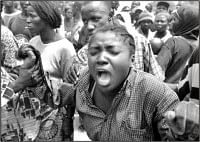Human Rights Advocacy
End political violence in Nigeria
 Amnesty International (AI) has joined a group of Nigerian NGOs to campaign for violence-free elections this month and calls for public participation in this petition. AI delegations travelled to Nigeria in January and March and gained support from Nigerian celebrities and senior political figures. Groups in Canada, Sweden, the Netherlands and Norway have also collected around 500 signatures and sent them to President Obasanjo.
Amnesty International (AI) has joined a group of Nigerian NGOs to campaign for violence-free elections this month and calls for public participation in this petition. AI delegations travelled to Nigeria in January and March and gained support from Nigerian celebrities and senior political figures. Groups in Canada, Sweden, the Netherlands and Norway have also collected around 500 signatures and sent them to President Obasanjo.
Thousands more will land of the desks of the President, state governors and other top politicians with a simple message: respect and protect human rights during the elections.
On 14 and 21 April, Nigerians will elect their presidential, parliamentary and gubernatorial representatives. AI has already received reports of several cases of political violence in the run-up to the elections, including the assassination of a journalist, political aspirants and their aides.
On 27 July 2006, Chief Funsho Williams, a candidate for Governor of Lagos State, was killed at home. The police stated that 244 suspects were arrested in connection with his murder, including several of his political associates and personal aides. By early December, 35 suspects remained in police custody. The specific charges against those who remained in detention are unclear.
On 14 August 2006, Dr Ayo Daramola, a candidate for Governor in Ekiti State, was shot and stabbed by armed men who forced their way into his home. Police arrested six young men in connection with the killing in October. One of the suspects is reported to have claimed that he was commissioned to kill Daramola by an aide of the incumbent Ekiti State Governor. The other suspects claimed that the motive was robbery.
Elections in 1999 and 2003 were characterised by high levels of political violence and fraud. In 2003, human rights abuses included political assassinations, harassment of rival candidates and violent clashes causing numerous fatalities. State-endorsed armed vigilante groups were responsible for large numbers of extrajudicial executions in the south-east of the country and were suspected of involvement in a number of unsolved killings of politicians.
Other abuses include harassment, torture and ill-treatment of human rights activists and those critical of the government. Politicians and officials, including people currently in office, have been implicated in orchestrating violence and assassination attempts using armed groups of civilians. The Nigerian government is not doing enough to address this political violence.
Nigeria has a population of over 140 million people. Seven out of 10 live on less than US$1 per day, a figure widely accepted as the measure of absolute poverty. This is despite Nigeria's status as the largest oil producer in Africa and the fifth-largest within the Organization of Petroleum Exporting Countries (OPEC).
Source: Amnesty International.